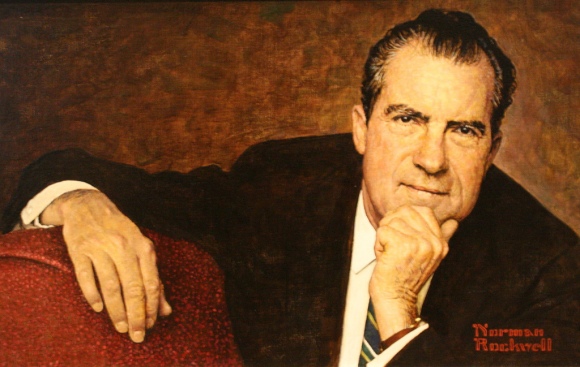Trigger Warning: anti-Black racism, segregation, imperialism
While there are growing signs that Donald Trump’s front-runner status in the Republican Presidential Primary is vulnerable, he remains a formidable contender for the time being. The specific language he has turned to in the past few weeks has increasingly hinted at the archetypal modern Republican politics he has tapped into in order to catapult himself to the front of the pack in a crowded primary. Although powerful, for many what he said might sound like an innocuous phrase – “silent majority”.
Specifically, he has repeatedly stated that his popularity within the primary is a reaction on the part of that “silent majority” which is using him in part of a broader effort at “taking our country back.” He tweeted using that specific wording before heading to an event in New Hampshire, but there was a recurrent focus on that language and the concept of a “silent majority” in the midst of some sort of return when he appeared in Alabama and in South Carolina. There’s a uniquely Southern political reading of this buried deep within, but the true political legacy Trump has remixed is a non-regional one. The interplay between the particular Southern appeal but also a more general sense of loud reaction bursting out of a “silent majority” recalls one particular Republican candidate from long before the more typical models of Reagan and the Bushes.
 Norman Rockwell’s portrait of Richard Nixon, from here.
Norman Rockwell’s portrait of Richard Nixon, from here.
If Nixon seems particularly odd and out of place in modern Republican politics, it’s for good reason. This forgets that Reagan and other major conservative icons were in many important ways the heirs of a Republican-centered political movement. There’s the familiar appeals to Goldwater’s brash rejection of the New Deal and fear of the Grand Society, but what’s forgotten is how Nixon took those comparatively extreme, election-losing perspectives and repackaged them. Part of that was of course the Southern Strategy – the deliberate appealing to White voters motivated by anti-poverty programs but also racist sentiments – but it was also picking at the threads of moderate and centrist political discomfort with a changing political landscape in which many new voices were increasingly audible. Nixon himself didn’t even the phrase “silent majority” – but he plucked it from a labor organizer’s mouth, and both made it popular and augmented his popularity with it. In many ways, the “silent majority” is a concept used to validate those breaking their ties with progressive and left-populist coalitions in favor of a more conservative, less radical alternative.
Of course, for the people who lived that history or have studied it, it’s clear what politics were actually advanced by Nixon and his successfully supportive “silent majority”. His administration organized coups in countries that democratically elected socialists, sold arms in a way that sowed the seeds for the horrifyingly overmilitarized Middle East of modern day, and carved out the modern and geographically-rooted face of racial segregation in the US. The political promise that held together his cobbled political support base was to give them what they secretly, desperately, silently wanted. The political toxicity that continues to hang over his name shows how untrue that ultimately was. Still, in many ways that has remained the Republican national coalition – a number of groups united in feeling under siege by a specific process of changing standards of what’s acceptable. Trump is reinventing himself to better fit the part (if by nothing else, recasting himself as a deeply devout Christian), but from the costume he’s slipping into and the stage he’s acting on, there’s a political heritage that he’s manipulating here.